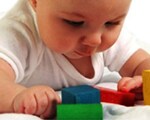The American Academy of Pediatrics (AAP) has issued a report that outlines new guidelines concerning the iron needs of infants and children.

The report also details new procedures for identifying and following up on signs of iron deficiency and iron anemia - procedures that rely not just on a single test, but rather a combination of screening techniques.
The long-term, irreversible effects iron can have on children's cognitive and behavioural development is now well known. It's critical to children's health that the iron status is improved starting in infancy. Feeding older infants and toddlers foods like meat, legumes and iron-rich fruits and vegetables, as well as iron-fortified cereals and fruits rich in vitamin C, which help iron absorption, can help prevent iron deficiency. In some cases, children still need liquid iron supplements or chewable vitamins to get the iron they need.
To prevent iron deficiency the AAP recommends that breast-fed infants be given 1 mg/kg per day of iron supplementation starting at 4 months, until a child begins to consume iron-fortified cereals. Experts note that while infants have enough iron in the first four months of life, breast milk does not actually contain a lot of iron. Infants on formula do not need additional iron supplementation and whole milk should not be given in the first year. Those babies eating food between the ages of 6 months to 1 year should be given red meat and iron-rich vegetables to satisfy their need for 11 mg of iron a day. That need drops to 7 mg/kg a day between the ages of 1 year and 3 years, and ideally this should also come from red meat, vegetables, and fruits with vitamin C to facilitate iron absorption. Supplements may also be given during this time, according to the AAP.
Babies born prematurely should be provided a minimum of 2 mg/kg of iron daily until 1 year of age. This means that those being breast-fed need to be given a 2 mg/kg supplement daily beginning at 1 month of age, and continuing until he or she begins to eat fortified cereals or iron-rich foods.
DoctorNDTV is the one stop site for all your health needs providing the most credible health information, health news and tips with expert advice on healthy living, diet plans, informative videos etc. You can get the most relevant and accurate info you need about health problems like diabetes, cancer, pregnancy, HIV and AIDS, weight loss and many other lifestyle diseases. We have a panel of over 350 experts who help us develop content by giving their valuable inputs and bringing to us the latest in the world of healthcare.












